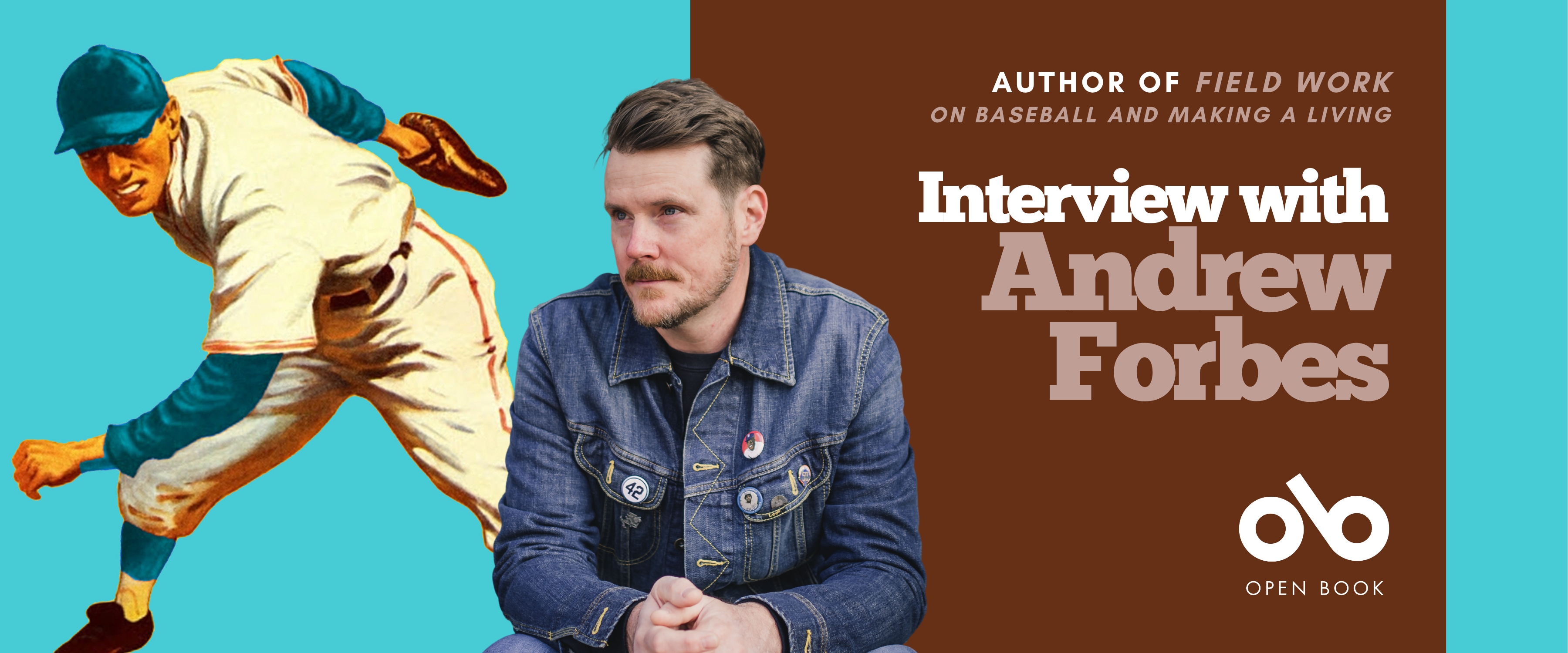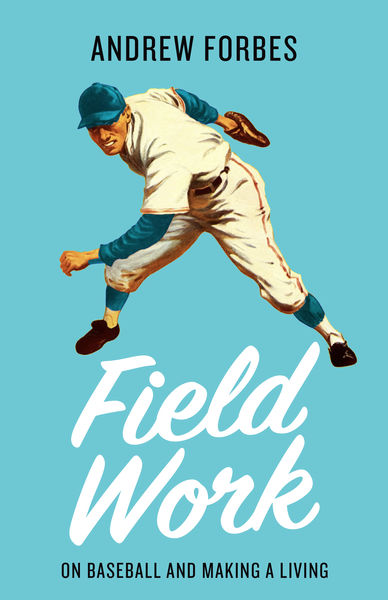Acclaimed Author Andrew Forbes Explores the Many Interesting Lives that are Made Around Baseball in Field Work
The work of Andrew Forbes has featured on Open Book a number of times in recents years, and the versatility of the author's work is plain to see. From novels to novellas to short fiction, he has won over fiction readers with critically acclaimed storytelling. But, Forbes is also very well known for his love of baseball, and the books that he has written about the sport.
This leads us to Field Work: On Baseball and Making a Living (Assembly Press), which serves as not only a meditation on this fabled game, but also explores all of the day-to-day efforts that go into making a living in the world of baseball. From professional players to those who foster young talent at the little league level, from fans to gamblers to the staff that operate the stadiums and parks, there are so many lives that revolve around the sport, and without those, it wouldn't be what it is in our cultural landscape.
So, join us today for some keen observations about baseball and everything that goes into the this unique and storied game, from an author whose passion about the sport is infectious, and whose deft hand does it justice on the page.
Open Book:
Tell us about your new book and how it came to be. What made you passionate about the subject matter you're exploring?
Andrew Forbes:
Field Work is a collection of essays about the relationship between labour and recreation, specifically work and baseball; when baseball becomes work, how it exists alongside our work lives. The spur was the story of Hub Pruett, a young student in Missouri who got an opportunity to play in the big leagues, and subsequently displayed a remarkable knack for striking out Babe Ruth, at least for a couple of years in the early 1920s. The fact that Pruett’s lifelong dream had not been to play professional baseball, but that he rather harboured a very different ambition, fascinated me when I first read about it. The story nestled in my brain and began a series of thoughts about how we define work and play, and how we incorporate them into our lives. Those thoughts became essays, and those essays became this book.
OB:
Is there a question that is central to your book? And if so, is it the same question you were thinking about when you started writing or did it change during the writing process?
AF:
As I said, I wanted to understand how what’s play for some of us is salaried work for others. I wanted to make room for that idea in my head, to accommodate the contradiction. The essays do wander a bit – one of the things I love about baseball is the wealth of good stories it serves up, and I followed several of those, like spokes off the hub. But the question remained central to the whole exercise, and I think I managed to connect everything. I guess the reader can ultimately determine that.
OB:
What was your research process like for this book? Did you encounter anything unexpected while you were researching?
AF:
Like my two previous collections of baseball writing, research was central to the process. Honestly, I think I assign myself these pieces as an excuse to spend long periods of time immersed in newspapers, statistical websites, census data, photo archives, even conducting interviews. The joy of research is equally divided between confirming what you’d hoped was true and discovering something completely unexpected. I learned, for example, that certain things I believed about my central figure, Pruett, just weren’t true. I discovered that the timelines of certain anecdotes were decidedly more complicated than I’d thought, and I had a chance to demystify a few statistics that had for decades been distorted or exaggerated in the retelling of Pruett’s story.
Your CanLit News
Subscribe to Open Book’s newsletter to get local book events, literary content, writing tips, and more in your inbox
OB:
What do you need in order to write – in terms of space, food, rituals, writing instruments?
AF:
Coffee and time, mostly. A laptop, instrumental music, often. I like to start early, preferably before the sun comes up. Sometimes there are candles, though those are a nice-to-have, not a need.
OB:
What do you do if you're feeling discouraged during the writing process? Do you have a method of coping with the difficult points in your projects?
AF:
If what we’re talking about is writer’s block, I try to have a few things going at the same time, so that if one project doesn’t seem to be getting any traction I can switch tracks and work on something else. I wrote this book while working on two other books of fiction, so there was always something else to do. In the case of stubborn facts, things I suspect but haven’t been able to confirm, I just keep digging. Also: deadlines are my friend. The more urgency I feel the easier the writing becomes.
OB:
What defines a great work of nonfiction, in your opinion? Tell us about one or two books you consider to be truly great books.
AF:
A great work of nonfiction surprises you by confronting you with something you didn’t realize you wanted to know about, but suddenly find yourself willing to talk about with evangelical fervour. It leaves you in awe about something you’d never thought to question. It illuminates a corner of the world in such a way that you can’t believe you didn’t search out answers earlier. It dazzles you with stories and facts that you’re astonished to find compelling.
To illustrate, I’d point to John McPhee’s writing on geology, published separately as four books and then collected (with a fifth book added) as Annals of the Former World. I’d been curious about geology, but McPhee’s writing had me hooked for 700 pages, hanging on the words of a geologist who’d pulled over on the side of the Interstate to examine a rock cut and point out the revelations it contains. McPhee also wrote a riveting book about oranges—called Oranges. A master.
___________________________________________
Andrew Forbes is the author of two previous collections of baseball writing—The Utility of Boredom (2016) and The Only Way Is the Steady Way (2021)—as well as two collections of short fiction, the novella McCurdle’s Arm, and a novel, The Diapause. He is an active member of the Society for American Baseball Research, having participated in several investigative projects. He has written for publications including the Toronto Star, Canadian Notes and Queries, and Maisonneuve Magazine, and his work has been nominated for the Danuta Gleed Literary Award and the Trillium Book Award. Originally from Ottawa, Forbes has lived in Atlantic Canada and rural Eastern Ontario, and now resides in Peterborough, Ontario. For more information, visit andrewgforbes.com.







